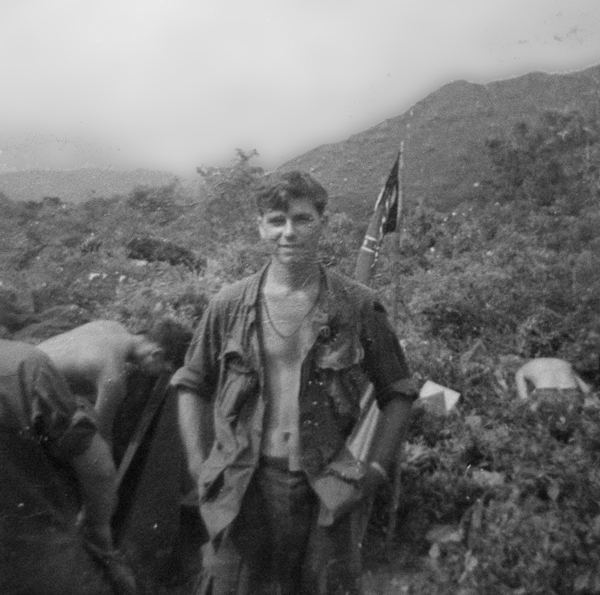
An Afternoon with Vietnam Veteran James Quinnett
In 1963, James Quinnett had graduated high school in Rialto, California. With plans of higher education in mind, he worked hard in the local steel mill in order to pay for his school. As Quinnett was saving money, working, and going to school, he spent his time between San Francisco and his hometown in Southern California. Quinnett also spent some time hitchhiking from San Francisco to New York; but, what Quinnett was subconsciously doing was avoiding the draft.
At the time, the United States was at war with Vietnam, possibly one of the most infamous and controversial wars in U.S. History.
“The hammer is going to come down at some point,” commented Quinnett. After his short time in New York, Quinnett fled to Montreal in the summer of 1965 to get further away from the draft. However, when Quinnett returned to California, he received a letter that would forever change his life. “I got the greetings from the president that I was drafted.”
Between reporting for boot camp, a month leave, and advanced infantry training, Quinnett had to be prepared to fly out from Travis Air Force Base in California to fight a war at only twenty years old. “The flight was long. We were ambushed the first day on the field,” commented Quinnett. During the ambush, the captain of Quinnett’s company was shot. The excutive officer–who is second in command–took over and Quinnett was his radio operator.
As Quinnett quickly confronted warfare in the Central Highlands of Vietnam, he had to report every death. His job as a radio operator in the was essential. Quinnett reported troop strength, ordered supplies and ammo from the base camp, and, during firefight, Quinnett coordinated troop movement, called in medivacs (helicopters for the wounded or sick), and identify and report every soldier KIA (killed in action).
According to government archives, there were 58, 220 deaths and more than 100,000 men injured. On numerous occasions, Quinnett’s platoon was sent to help Marine forces in the Que Son Valley. Because Marine forces mainly walked through the steep hills of Vietnam, several of Quinnett’s men lost their lives trying to help out their fellow Marine allies. Out of the 100 men that first began with Quinnett, 40 would not live to go back home. “There were never enough replacements,” added Quinnett.
“We were all mostly poor men,” said Quinnett regarding his platoon. “There were men from all over the country including Puerto Ricans and Native Americans. We were a diverse group, and what we all had in common is that we were all scared of what may happen next.”
One member of Quinnett’s platoon, Eddie Micus specifically stood out to Quinnett during their time in Qua Son Valley. Quinnett and his platoon had taken over a Marine base during the Tet Offensive and the commander lead the brigade through a rice paddy. As they were moving in, the two men who were to the side of their commander were shot dead and the ambush began.
“Eddie was a catholic boy from Iowa and he was very pro-war,” said Quinnett. “We would bump heads a lot, but we got along really well for the most part.” Micus, who was trying to defend his platoon and himself during the ambush, was shot in the stomach. As Quinnett identified the casualties of the men, or as he called it, “identifying the dead,” he called a chopper to rescue those injured. As the helicopter arrived, Eddie Micus was rushed to the aircraft. “The last I saw Eddie, he gave me a thumbs up, and off he went.”
Little did Quinnett know that fifty years later, they would be re-united. Ironically enough, Quinnett’s mother and Micus’s mother ran in to each other at a post office years later. The two kept in touch, but it wasn’t until 2013 that the two would see each other after fifty years, here in Abilene, Texas.
“Eddie went on to become a poet and novelist,” said Quinnett. In 2013, the McMurry English department brought Eddie Micus as their guest writer for the Knox-Bennett Lectures. “When I saw Eddie at the airport, we immediately picked up were we left off. It was a great feeling,” commented Quinnett on seeing his former comrade after such a long time.
Quinnett eventually was able to take a much deserved leave after serving for six months after such ambushes. He took leave in Japan for one week and a week Taiwan as well. Being that the tours were 12 months long, Quinnett thoroughly enjoyed his R&R. “Even though it was time off, it still wouldn’t get my mind off of the things I saw. I was confused and not a lot made sense.”
In February of 1968, Quinnett contemplated his upcoming trip back to America, and tried to put his time in Vietnam behind him. “I didn’t want to go back. I actually planned to stay because either way, even though I didn’t agree with the war, I wasn’t going to be accepted back home,” added Quinnett.
Many of the soldiers returning home from Vietnam experienced extreme hardship. According to Historian Dante Ciampaglia, “As more and more wartime atrocities came to light, there was a national implication of guilt and shame placed on Vietnam veterans as participants in and avatars of a brutal, unsuccessful war.” Thus, many of the veterans, including Quinnett, were angry and confused, leaving them with a sentiment of being unwanted in their own country.
Eventually, however, Quinnett returned to the U.S. When he returned, he was sitting at a bar and he met a young boy who was about to be sent out to Vietnam. “The cycle continued,” said Quinnett, “one man left, and another was sent. I couldn’t drink, I couldn’t vote, but I was able to go off to war and kill.”
After the war, Quinnett obtained his degree and moved around from job-to-job until he met his wife, a native Texan. Soon after, Quinnett found himself in Dallas for nine years and then eventually found McMurry. Quinnett has been with McMurry for over twenty years and is the senior web master.
